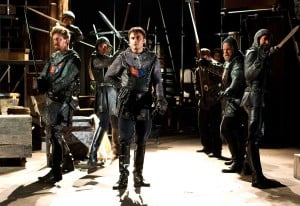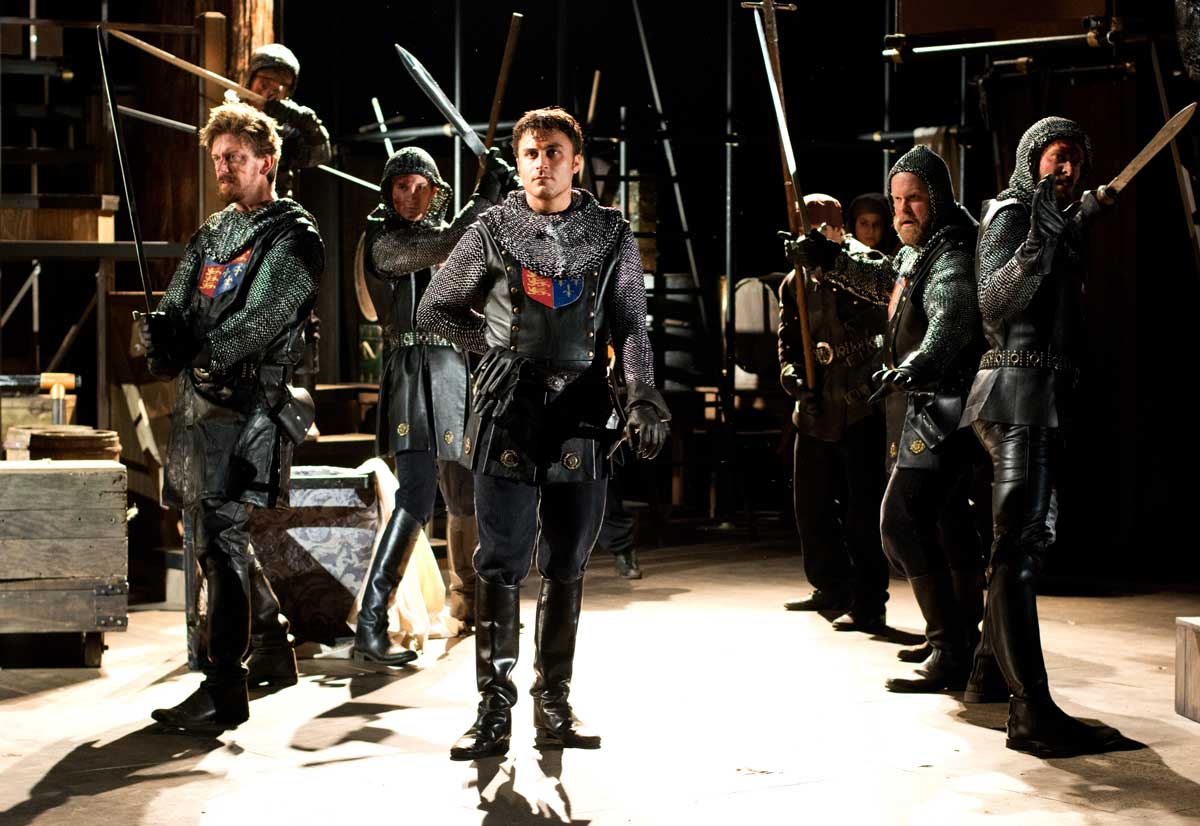
Walking into Shakespeare’s “Henry V” without having read its synopsis and that of the tetralogy’s earlier plays can be challenging because there is an assumed knowledge that the average audience member likely won’t have. It falls instead to the Chorus – which in director Paul Mullins’ production of “Henry V” at Shakespeare Santa Cruz comes in the form of artistic director Marco Barricelli – to guide us through the play. Barricelli injects the past and distant world of the production with modernity, and reappears throughout the play to fill in blanks, comment on events and otherwise heighten our willingness to suspend disbelief over the spartan but well-used set.
As the final installment of the tetralogy that charts Prince Hal’s growth from his youthful revelry amongst London’s lowlifes to his assumption of the throne of England, “Henry V” picks up where “Henry IV Part II” left off. Prince Hal (Charles Pasternak, who also played Prince Hal in last year’s “Henry IV Part II”) is now the King of England, but his position is not fully secure: he still needs to prove that his youthful antics are behind him and that he is indeed a strong king. When there is an opportunity to claim land from France, and the French reject his request with an insulting gift – tennis balls, a reference to his embarrassing adolescence – Henry has the perfect excuse to go to war.

However, this is still somewhat tenuous, a fact which weighs heavily on Henry in the text, even after he declares war. War will help unite the country and ensure him glory and respect as King, but is it worth the blood that will be shed? In this production, Henry’s advisor presents the opportunity for war with light-hearted comedy — he bears a resemblance to the garrulous, fumbling Polonius — and Henry promptly decides to go to war almost immediately, with little thought and no concerns.
In fact, because Mullins’s production moves at a breakneck pace, all of Henry’s actions seem rash, yet these decisions are difficult and should have more weight. For example, when he discovers the thief among his soldiers is a former friend from his youth whom he had promised never to harm, can he afford to spare him, or is there a greater cause to serve? Even after the St Crispin’s Day battle at Agincourt, we see no signs of exhaustion or labor: the whole journey has proved an easy one, during which he has gathered strength and command but not strength of character.

Nevertheless, Mullins is very effective at showing us the differences between the French and the English. Henry chases honor but with some trepidation; the French Dauphin (William Elsman, in a commanding turn) exclusively chases glory to serve his vanity without regard for the sacrifices it will require. The night before the Battle of Agincourt, while Henry mulls about camp in disguise, self-effacing in an effort to understand how his men are feeling, the Dauphin merely brags to his men about how anxious he is for the next day so that he can defeat the English. During the battle scenes, Mullins seamlessly shift the focus from one front to the other by changing which action is downstage.
What the production lacks in perspicacity, it makes up for with great production values, and perfectly staged scenes. The scenes that occur at camp on the night before Agincourt have an added sense of realism by being staged outdoors – when it is actually pitch black – while battle scenes deftly skirt the need for stage fighting by keeping the focus on the characters, and often having the troupes in tableau while the main action of the scene occurs. The talented cast effectively plays with rhythm and speed of delivery to elucidate the dialogue, making this an altogether accessible production overall.
Student tickets are $15. Everyone can purchase rush tickets one hour prior to performance for $20.
